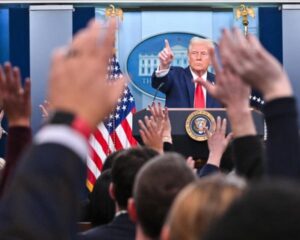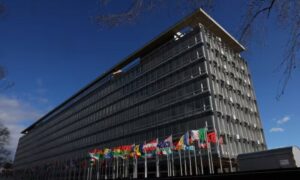Since Donald Trump’s ‘landslide’ win in the November 2024 US presidential election, the European Union is nervously braced for a tidal wave that would shake the foundation of the transatlantic partnership and put the bloc’s unity to test.
Within a couple of months, Brussels hastily sealed a trade agreement with four Mercosur countries viz, Argentina, Brazil, Paraguay and Uruguay; carried out the biggest overhaul of the EU-Switzerland trade ties; and concluded a stalled trade agreement with Mexico to showcase its strength to the tariff man.
In Europe, looming Trump’s tariffs are nudging Berlin and Paris closer, driving French President Emmanuel Macron and German Chancellor Olaf Scholz into demonstrating unity to the transactional US president who has lambasted the EU for treating the US “very, very badly” and will stack up obstacles for the European countries.
But the real challenge to the bloc stems from internal divisions. For instance, key European powers, France and Germany, differ on several issues ranging from deployment of troops to Ukraine and nuclear power to the South American deal. Unlike Berlin, Paris has wanted to send troops to the Ukraine war, is committed to build nuclear reactors, and abhors the Mercosur accord, believing it would undermine the French farmers with a tide of cheap poultry and beef from Latin America.
Trump’s return has forced them to exhibit cohesion. These deep-seated resentments toward each other could dominate their aspiration of forging a joint response against the US. Both Macron and Scholz have weakened politically at home, further dimming the hopes to respond to Trump with one-voice.
Macron is an ardent campaigner of European strategic autonomy. Berlin, irrespective of whoever becomes the next German chancellor, will cling to Atlanticism. Although the former advocates for a “united, strong and sovereign Europe” and later describes Trump as a “challenge”, divergent approaches of the two countries will continue to strain the Franco-German relationship, hampering the EU ability to construct a resilient alliance against Trump.
In Davos, the European Commission President Ursula von der Leyen used the World Economic Forum (WEF) to warn Trump that the EU would expand relations “not only with our long-time like-minded friends, but with any country we share interests with”. His speech was disseminated as the European response to Trump’s “America First” presidency.
Yet unfazed by her diplomatic maneuvers, Trump ripped the EU apart with his grandiloquence. In his virtual address at the WEF, he continued to thump the bloc for having “hundreds of billions of dollars” of deficit and not buying the US farm produce and cars and derided the Union’s red tape, pointing to recent multibillion fines on Apple and Google while accusing it of flooding America with millions of vehicles.
Hours after Trump signed an executive order to pull the US out of the Paris Agreement on climate change, putting America in line with the likes of Iran and Yemen, von der Leyen pitched the climate treaty as a “best hope for all humanity” and boasted of the EU’s new partnerships with Mercosur, Switzerland and Mexico in an effort to portray the EU as a unified bloc.
While France-Germany tensions pose a serious threat to pan-Europeanism, EU unity is being further imperiled by the advent of the Eurosceptic, right-wing bloc comprising Hungary, Slovakia, Austria, and possibly Czechia. The nationalist leaders such as Italy’s George Meloni, the only EU leader invited to Trump’s inauguration, and Hungary’s Victor Orban, a longtime admirer of the deal maker, will also help Trump to split the Union and capitalise on the EU internal weaknesses.
Leaders across the EU are urging to stick together in dealing with Trump’s “zero-sum” trade war. These calls aren’t new. Several European leaders in the past have made such appeals without the European dream of becoming a formidable global force, capable of coping with economic and strategic challenges, coming into fruition.
Brussels has only itself to blame for stranding the bloc into this hapless position. By disregarding the downsides of the Biden administration’s China-only tariff policy, the EU submitted to the US and torched its vital tool of strategic ambiguity, which would have helped it to become a major power broker and served as a hedge against the impending Trumpism.
Once Trump returned, the EU found it sheepishly apologetic, geopolitically isolated and strategically limbless in its effort to withstand the US president’s tariff barrage and remain globally relevant. The way things are unfolding, Brussels could even struggle to sustain its distinctiveness as a bloc internationally with a possible China-US detente ruining its ambition of making the EU an influential player internationally.
A fragmented Brussels lacks options to brave Trump who has stunned America’s transatlantic allies by asking them to raise their defence spending to a whopping 5% of their GDP and could threaten to upend the US defence and security guarantee if Europe decides to retaliate by hitting America with its own tariffs. With divisions continuing to beleaguer the bloc, the EU is rather a soft target for Trump.
- Desk Reporthttps://foresightmags.com/author/admin/











